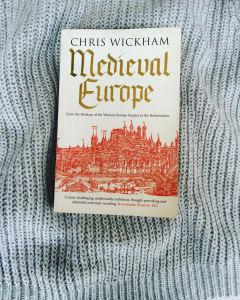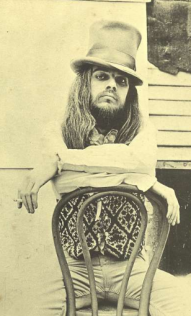 As some of you may remember, it was recently my birthday, and I was lucky enough to receive some new books from my boyfriend. I’ve already read and reviewed the first book, The Unwomanly Face of War, which I absolutely adored (review here)! Feeling buoyed from such success, and following on from non-fiction November, I decided to go ahead and start the second book before the month was out.
As some of you may remember, it was recently my birthday, and I was lucky enough to receive some new books from my boyfriend. I’ve already read and reviewed the first book, The Unwomanly Face of War, which I absolutely adored (review here)! Feeling buoyed from such success, and following on from non-fiction November, I decided to go ahead and start the second book before the month was out.
Whilst The Unwomanly Face of War was still very much a non-fiction book, it was written using such an interesting technique that the book felt extremely personal and emotive, making it a very accessible piece of non-fiction. This next book, although falling into a similar genre of a non-fiction historical book, is very different in style. This book is an academic text which takes a much broader and far more removed look at a period of history. As you may guess from its title, Medieval Europe, the book is focused solely upon the medieval time period between the years 500 to 1500. Also commonly referred to as the Middle Ages or the Dark ages, Chris Wickham takes us on a journey which tracks the major changes and events which occurred throughout Europe. This timeline takes us from the decline of the Western Roman Empire, right up to before the infamous Reformation, with far more events in between.
I think its clear from the main introduction of this book , as well as the ideas and arguments which Wickham puts forwards, that this book is an extremely academically based text. He writes in a very sophisticated manner which allows his expertise in this field of subject to naturally shine through. It’s immediately clear that Wickham has a wealth of knowledge from which we can improve our own minds, and he is after all a distinguished Professor of Medieval History at the University of Oxford. Whilst this makes for great accuracy in the book and supports a readership which holds great faith in its author, it also means the book isn’t anywhere near as accessible a read as The Unwomanly Face of War. I think if you have experience with academic texts or essays, or you have some basic understanding or great interest in the medieval period, then this might be a book more tailored to you. Having said that, I do think that anyone who reads the blurb of this book or reads a quick summary of its introduction will understand that it is quite an intellectual and informative read which may not be as easy going as more introductory books.
I think one of the selling points of this book is its very ambitious design of covering the entire of European medieval history, as opposed to solely British. I really enjoyed this, as we learn barely anything about medieval history during compulsory education, let alone the wider geographical locations which also developed during this time period. I thought the information about France in particular was very fascinating, reminding us that the history of our own country was often interdependent on the events of another. Of course, Europe is an extremely large continent, so some place are mentioned more than other, but I think Wickham did an excellent job of focusing upon the events which were the most pivotal moments within the medieval period. It was also just really interesting to learn about the vastly different geographical face of Europe in this time, charting how the different locations have evolved or changed over this time frame.
This wide study of Europe, whilst excellent in capturing the overall essence of this time frame, does mean that the sheer scale of this book is staggering. This isn’t a book which focuses upon small interesting details and facts, but one which looks much more intently at the bigger picture overall. Politics, religion and the economy are the main plot points of this book, which provide a detailed analysis of how the structures of medieval society adapted over time. This does mean that this book is incredibly dense, and inevitably dry in places, although Wickham does do a good job of allowing his personality to infiltrate his work occasionally. For someone like me who has a good knowledge of general history, but is lacking in more specific knowledge of the medieval period, I struggled quite a lot at time to keep track of the political movements especially. As is inevitable when covering a period as large as this, there is a staggering amount of names and people to be covered, which did often leave me feeling confused. This is definitely not a book to read in one sitting!
Something which I found increasingly interesting whilst reading this book was the reminder that there is actually a great deal of uncertainty surrounding this time. This is an incredibly early period of European history, and often there is little or no evidence to assert historical accuracy. The medieval period was where we first see such a rise in the use of literature, especially through the forms of religious scripture. It is because of examples such as this, from the rare individuals who were able to write, that we do have records from this time. Even so, this is still a tricky period of time to discover the complete truth about, as its distant age would suggest.
I enjoyed this book, but I did find it hard going at times. Going in to this with limited knowledge of the medieval period meant that the staggering amount of information I received was extremely hard to process at times. Likewise, the fact that this book focuses upon the larger political movements, as opposed to small, perhaps gritty details, made the information quite difficult to retain. Even so, I do feel that I’ve massively increased my knowledge in this area, and Wickham has done an excellent job of providing such a detailed academic text. If you’re looking for more of an introductory course into medieval history, or perhaps a more limited and specific read, then I probably wouldn’t recommend this to you. On the other hand, if you already have some idea of the workings of this period, or are a history enthusiast, then I think this is a wonderfully informative look at the overall changing structure of medieval Europe.
Publisher: Yale University Press
Rating: 3*/5*
Advertisements Share this:





